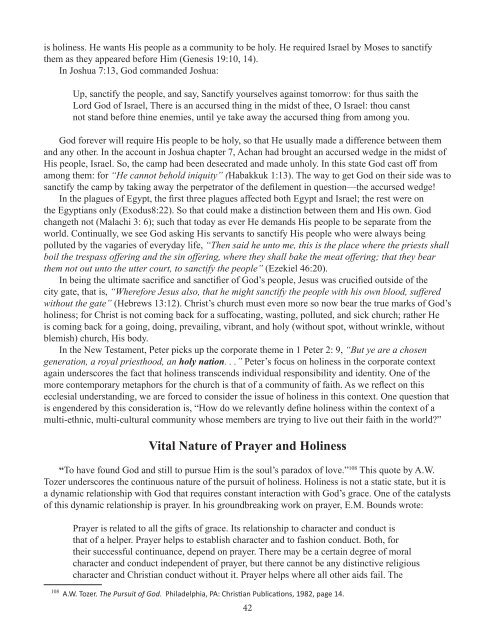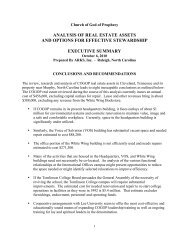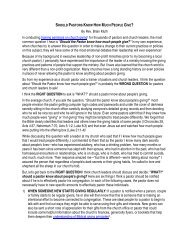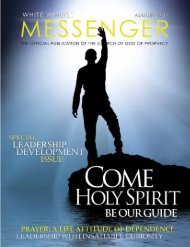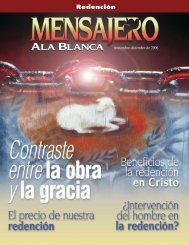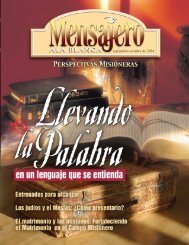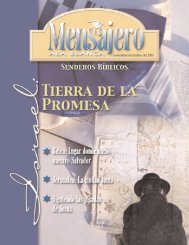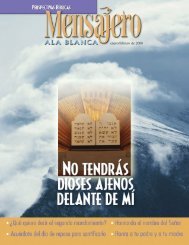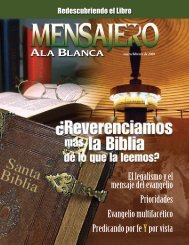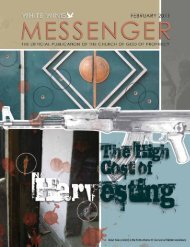The Pursuit of the Holy God - Church of God of Prophecy
The Pursuit of the Holy God - Church of God of Prophecy
The Pursuit of the Holy God - Church of God of Prophecy
Create successful ePaper yourself
Turn your PDF publications into a flip-book with our unique Google optimized e-Paper software.
is holiness. He wants His people as a community to be holy. He required Israel by Moses to sanctify<br />
<strong>the</strong>m as <strong>the</strong>y appeared before Him (Genesis 19:10, 14).<br />
In Joshua 7:13, <strong>God</strong> commanded Joshua:<br />
Up, sanctify <strong>the</strong> people, and say, Sanctify yourselves against tomorrow: for thus saith <strong>the</strong><br />
Lord <strong>God</strong> <strong>of</strong> Israel, <strong>The</strong>re is an accursed thing in <strong>the</strong> midst <strong>of</strong> <strong>the</strong>e, O Israel: thou canst<br />
not stand before thine enemies, until ye take away <strong>the</strong> accursed thing from among you.<br />
<strong>God</strong> forever will require His people to be holy, so that He usually made a difference between <strong>the</strong>m<br />
and any o<strong>the</strong>r. In <strong>the</strong> account in Joshua chapter 7, Achan had brought an accursed wedge in <strong>the</strong> midst <strong>of</strong><br />
His people, Israel. So, <strong>the</strong> camp had been desecrated and made unholy. In this state <strong>God</strong> cast <strong>of</strong>f from<br />
among <strong>the</strong>m: for “He cannot behold iniquity” (Habakkuk 1:13). <strong>The</strong> way to get <strong>God</strong> on <strong>the</strong>ir side was to<br />
sanctify <strong>the</strong> camp by taking away <strong>the</strong> perpetrator <strong>of</strong> <strong>the</strong> defilement in question—<strong>the</strong> accursed wedge!<br />
In <strong>the</strong> plagues <strong>of</strong> Egypt, <strong>the</strong> first three plagues affected both Egypt and Israel; <strong>the</strong> rest were on<br />
<strong>the</strong> Egyptians only (Exodus8:22). So that could make a distinction between <strong>the</strong>m and His own. <strong>God</strong><br />
changeth not (Malachi 3: 6); such that today as ever He demands His people to be separate from <strong>the</strong><br />
world. Continually, we see <strong>God</strong> asking His servants to sanctify His people who were always being<br />
polluted by <strong>the</strong> vagaries <strong>of</strong> everyday life, “<strong>The</strong>n said he unto me, this is <strong>the</strong> place where <strong>the</strong> priests shall<br />
boil <strong>the</strong> trespass <strong>of</strong>fering and <strong>the</strong> sin <strong>of</strong>fering, where <strong>the</strong>y shall bake <strong>the</strong> meat <strong>of</strong>fering; that <strong>the</strong>y bear<br />
<strong>the</strong>m not out unto <strong>the</strong> utter court, to sanctify <strong>the</strong> people” (Ezekiel 46:20).<br />
In being <strong>the</strong> ultimate sacrifice and sanctifier <strong>of</strong> <strong>God</strong>’s people, Jesus was crucified outside <strong>of</strong> <strong>the</strong><br />
city gate, that is, “Wherefore Jesus also, that he might sanctify <strong>the</strong> people with his own blood, suffered<br />
without <strong>the</strong> gate” (Hebrews 13:12). Christ’s church must even more so now bear <strong>the</strong> true marks <strong>of</strong> <strong>God</strong>’s<br />
holiness; for Christ is not coming back for a suffocating, wasting, polluted, and sick church; ra<strong>the</strong>r He<br />
is coming back for a going, doing, prevailing, vibrant, and holy (without spot, without wrinkle, without<br />
blemish) church, His body.<br />
In <strong>the</strong> New Testament, Peter picks up <strong>the</strong> corporate <strong>the</strong>me in 1 Peter 2: 9, “But ye are a chosen<br />
generation, a royal priesthood, an holy nation. . .” Peter’s focus on holiness in <strong>the</strong> corporate context<br />
again underscores <strong>the</strong> fact that holiness transcends individual responsibility and identity. One <strong>of</strong> <strong>the</strong><br />
more contemporary metaphors for <strong>the</strong> church is that <strong>of</strong> a community <strong>of</strong> faith. As we reflect on this<br />
ecclesial understanding, we are forced to consider <strong>the</strong> issue <strong>of</strong> holiness in this context. One question that<br />
is engendered by this consideration is, “How do we relevantly define holiness within <strong>the</strong> context <strong>of</strong> a<br />
multi-ethnic, multi-cultural community whose members are trying to live out <strong>the</strong>ir faith in <strong>the</strong> world?”<br />
Vital Nature <strong>of</strong> Prayer and Holiness<br />
“To have found <strong>God</strong> and still to pursue Him is <strong>the</strong> soul’s paradox <strong>of</strong> love.” 108 This quote by A.W.<br />
Tozer underscores <strong>the</strong> continuous nature <strong>of</strong> <strong>the</strong> pursuit <strong>of</strong> holiness. Holiness is not a static state, but it is<br />
a dynamic relationship with <strong>God</strong> that requires constant interaction with <strong>God</strong>’s grace. One <strong>of</strong> <strong>the</strong> catalysts<br />
<strong>of</strong> this dynamic relationship is prayer. In his groundbreaking work on prayer, E.M. Bounds wrote:<br />
Prayer is related to all <strong>the</strong> gifts <strong>of</strong> grace. Its relationship to character and conduct is<br />
that <strong>of</strong> a helper. Prayer helps to establish character and to fashion conduct. Both, for<br />
<strong>the</strong>ir successful continuance, depend on prayer. <strong>The</strong>re may be a certain degree <strong>of</strong> moral<br />
character and conduct independent <strong>of</strong> prayer, but <strong>the</strong>re cannot be any distinctive religious<br />
character and Christian conduct without it. Prayer helps where all o<strong>the</strong>r aids fail. <strong>The</strong><br />
108 A.W. Tozer. <strong>The</strong> <strong>Pursuit</strong> <strong>of</strong> <strong>God</strong>. Philadelphia, PA: Christian Publications, 1982, page 14.<br />
42


